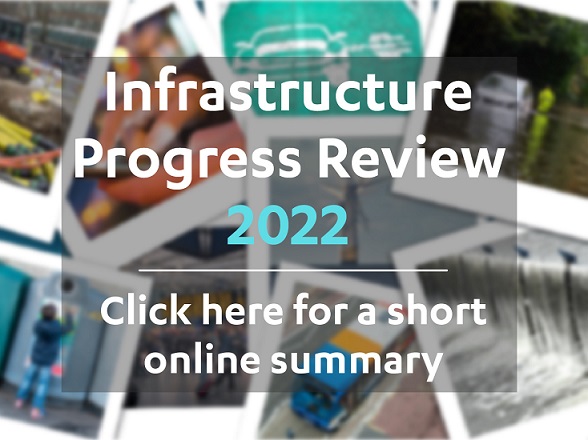The government is at risk of failing to deliver the aims of its National Infrastructure Strategy unless it picks up the pace with detailed policy design and implementation, the UK’s official independent infrastructure adviser has warned.
The National Infrastructure Commission says that clear, long term goals are now in place across most infrastructure areas and gives credit for increased investment – a £100 billion commitment over the next three years, alongside an indication of increased spending in the long term.
The Commission’s annual review of government progress on infrastructure also notes that some of the advisory body’s key recommendations have been delivered this year, including the creation of the UK Infrastructure Bank, and that both gigabit broadband coverage and renewable electricity capacity have continued to increase.
However, slow progress in other areas poses threats to achieving key objectives at the heart of the National Infrastructure Strategy. That government document, published in 2020, set out plans for infrastructure to help boost economic growth across all parts of the UK and meet the net zero emissions target by 2050.
Since that publication, “some of the strategies government has developed over the last year lack detailed delivery policy, leave key gaps, or simply do not go far enough,” says the report.
It highlights ten priorities for the year ahead, including the urgent need for a comprehensive energy efficiency push to insulate homes, devolved funding to more councils for local transport schemes, and the need to accelerate the roll out of electric vehicle charging points to ensure the 2030 date for the end of the sale of new petrol and diesel cars remains viable.
It assesses recent government activity against five tests: a long term perspective, clear goals and plans to achieve them, firm funding commitments, a genuine commitment to change, and action on the ground.
The Commission highlights the need for a pipeline of mass urban transit schemes beyond the planned development of such a project for West Yorkshire, and a rapid shift away from competitive bidding between councils for short term transport funding pots, towards long term devolved funding settlements.
The Commission’s report also flags the need for big decisions on how the net zero transition will be funded: “Ultimately, that will either be taxpayers, consumers, or a combination of both. But ensuring the costs are distributed fairly is critical. Delays to decisions on who pays are now holding up delivering infrastructure, including low carbon heat and energy efficiency. Open and honest conversations, followed by clear decisions, are needed to address this.”
Writing in the report’s foreword, Commission Chair Sir John Armitt says:
“At a time of significant global volatility alongside concerns about rising living costs, we appreciate that sticking to a long term strategy is not easy.
“But it is the only way to address the stubbornly difficult problems that will not become any easier or cheaper to solve by delaying action – and the quicker we tackle them, the quicker society and our environment will reap the benefits.”
Notes
The Review identifies what the government’s infrastructure priorities for 2022 should be:
| Area | Priority action for the year ahead |
|---|---|
| Digital | Set out an assessment of the country’s future wireless connectivity needs and how mobile networks will need to evolve to meet future demand, articulating the balance between what the market can deliver and where government needs to intervene |
| Energy | Improve energy efficiency schemes to put the country on track to deliver the government target for as many homes as possible to be EPC C rated or above by 2035 |
| Energy | Publish a detailed plan to deliver at least the 5 MtCO2 per year of engineered removals by 2030 ambition in the Net Zero Strategy |
| Floods | Set out a long term measurable objective for what flood resilience policy in England is trying to achieve |
| Water | Strengthen and progress plans for reducing per capita water consumption to deliver the targeted 110 litres per person per day by 2050 |
| Waste | Deliver increased recycling rates by finalising policy on key areas such as extended producer responsibility, deposit return schemes, recycling consistency and bans on certain types of plastics |
| Transport | To achieve tangible improvements in local transport, government must: Move away from competitive bidding for multiple, centrally controlled, short term funding pots and make fast progress towards devolving five year integrated funding settlements for transport spending to local authorities outside the city region combined authorities Support local authorities in developing plans for major urban transport schemes in a number of priority cities, including plans to develop a mass transit system for West Yorkshire |
| Transport | Initiate a step change in the rate of deployment of charge points to get on track to deliver the infrastructure needed to facilitate the 2030 end to new diesel and petrol car and van sales |
| Regulation | Building on the publication of the Economic Regulation Paper to complete a review of regulators’ statutory duties |
| Resilience | Set out improvements to resilience standards and stress testing in the National Resilience Strategy |





